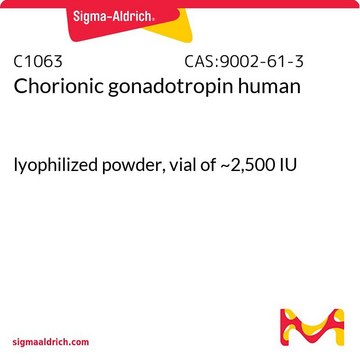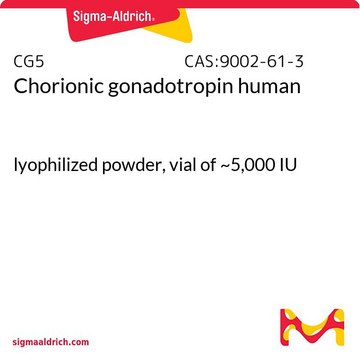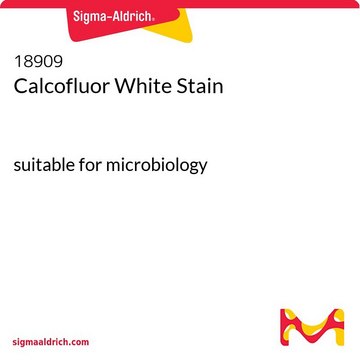L1898
[D-Ala6]-LH-RH acetate salt hydrate
≥97% (HPLC)
Synonym(s):
(D-Ala-6) Luteinizing Hormone Releasing Hormone
About This Item
Recommended Products
Quality Level
Assay
≥97% (HPLC)
composition
Peptide content, ≥65%
UniProt accession no.
storage temp.
−20°C
SMILES string
[H]O[H].CC(O)=O.CC(C)C[C@H](NC(=O)[C@@H](C)NC(=O)[C@H](Cc1ccc(O)cc1)NC(=O)[C@H](CO)NC(=O)[C@H](Cc2c[nH]c3ccccc23)NC(=O)[C@H](Cc4cnc[nH]4)NC(=O)[C@@H]5CCC(=O)N5)C(=O)N[C@@H](CCCNC(N)=N)C(=O)N6CCC[C@H]6C(=O)NCC(N)=O
InChI
1S/C56H77N17O13.C2H4O2.H2O/c1-29(2)20-39(50(81)67-38(10-6-18-61-56(58)59)55(86)73-19-7-11-44(73)54(85)63-26-45(57)76)68-47(78)30(3)65-49(80)40(21-31-12-14-34(75)15-13-31)69-53(84)43(27-74)72-51(82)41(22-32-24-62-36-9-5-4-8-35(32)36)70-52(83)42(23-33-25-60-28-64-33)71-48(79)37-16-17-46(77)66-37;1-2(3)4;/h4-5,8-9,12-15,24-25,28-30,37-44,62,74-75H,6-7,10-11,16-23,26-27H2,1-3H3,(H2,57,76)(H,60,64)(H,63,85)(H,65,80)(H,66,77)(H,67,81)(H,68,78)(H,69,84)(H,70,83)(H,71,79)(H,72,82)(H4,58,59,61);1H3,(H,3,4);1H2/t30-,37+,38+,39+,40+,41+,42+,43+,44+;;/m1../s1
InChI key
KGUIXKYKIZMKMT-JGUOWLKQSA-N
Gene Information
human ... GNRH1(2796)
Looking for similar products? Visit Product Comparison Guide
Amino Acid Sequence
Application
Biochem/physiol Actions
Signal Word
Danger
Hazard Statements
Precautionary Statements
Hazard Classifications
Repr. 1B
Storage Class Code
6.1C - Combustible acute toxic Cat.3 / toxic compounds or compounds which causing chronic effects
WGK
WGK 3
Flash Point(F)
Not applicable
Flash Point(C)
Not applicable
Personal Protective Equipment
Choose from one of the most recent versions:
Already Own This Product?
Find documentation for the products that you have recently purchased in the Document Library.
Our team of scientists has experience in all areas of research including Life Science, Material Science, Chemical Synthesis, Chromatography, Analytical and many others.
Contact Technical Service![[des-Gly10, D-Ala6]-LH-RH ethylamide acetate salt hydrate ≥97% (HPLC), powder](/deepweb/assets/sigmaaldrich/product/structures/150/195/13e08743-1592-4a6b-937d-559f571a2193/640/13e08743-1592-4a6b-937d-559f571a2193.png)









